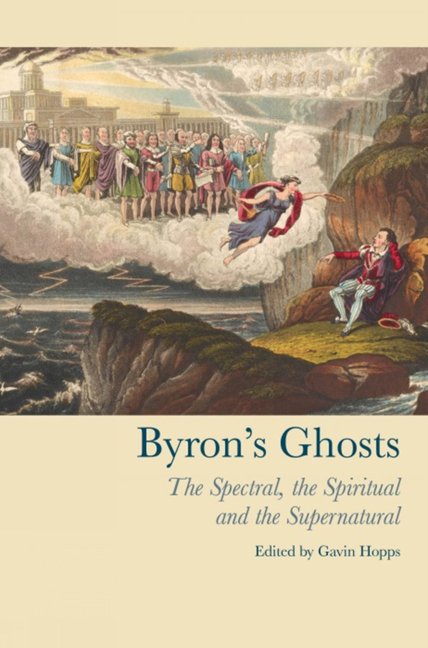Book contents
- Frontmatter
- Dedication
- Contents
- Acknowledgements
- Texts and Abbreviations
- Introduction: The Re-Enchantment of Romanticism
- Chapter 1 Determining Unknown Modes of Being: A Map of Byron's Ghosts and Spirits
- Chapter 2 Shades of Being: Byron and the Trespassing of Ontology
- Chapter 3 Byron and the Noonday Demons
- Chapter 4 Conjuration and Exorcism: Byron's Spectral Rhetoric
- Chapter 5 Byron avec Sade: Material and Spectral Violence in Childe Harold's Pilgrimage Canto IV
- Chapter 6 ‘’Twixt Life and Death’: Childe Harold's Pilgrimage, Don Juan and the Sublime
- Chapter 7 Byron, Ann Radcliffe and the Religious Implications of the Explained Supernatural in Don Juan
- Chapter 8 The Haunting of Don Juan
- Chapter 9 Being neither Here nor There: Byron and the Art of Flirtation
- Afterword: Blowing on a Dead Man's Embers: Byron's Biographical Ghosts
- Bibliography
- Notes on Contributors
- Index
Afterword: Blowing on a Dead Man's Embers: Byron's Biographical Ghosts
- Frontmatter
- Dedication
- Contents
- Acknowledgements
- Texts and Abbreviations
- Introduction: The Re-Enchantment of Romanticism
- Chapter 1 Determining Unknown Modes of Being: A Map of Byron's Ghosts and Spirits
- Chapter 2 Shades of Being: Byron and the Trespassing of Ontology
- Chapter 3 Byron and the Noonday Demons
- Chapter 4 Conjuration and Exorcism: Byron's Spectral Rhetoric
- Chapter 5 Byron avec Sade: Material and Spectral Violence in Childe Harold's Pilgrimage Canto IV
- Chapter 6 ‘’Twixt Life and Death’: Childe Harold's Pilgrimage, Don Juan and the Sublime
- Chapter 7 Byron, Ann Radcliffe and the Religious Implications of the Explained Supernatural in Don Juan
- Chapter 8 The Haunting of Don Juan
- Chapter 9 Being neither Here nor There: Byron and the Art of Flirtation
- Afterword: Blowing on a Dead Man's Embers: Byron's Biographical Ghosts
- Bibliography
- Notes on Contributors
- Index
Summary
‘Every great man’, observed Oscar Wilde, ‘has his disciples and it is always Judas who writes the biography.’ Wilde was fortunate to have Richard Ellman as his eventual biographer, but the genre continues to be held in a bad light, especially by poets and novelists. John Updike considered that ‘even the best biographies are too long’ and asked: ‘what is the point of them anyway?’ Playing the devil's advocate in the opening essay from his Works on Paper: The Craft of Biography and Autobiography, Michael Holroyd stated that he can see how, for some, biographers seem like parasites feeding off ‘pre-digested carrion’, attempting either to replace literature or ‘rob us of its enchantment’.
W.H. Auden believed that what every author hopes to receive from posterity is justice – a hope, he believed, that is usually disappointed. Larkin, reviewing Peter Ackroyd's biography of T.S. Eliot, believed that ‘If Eliot wished to live quietly, succeeding in avoiding notice, living and partly living, without making his life a continual allegory, then he had a right to do so.’ But, he concludes: ‘Truly it is not worth putting people off, they will get you whatever precautions you take.’ Larkin's diaries, it will be recalled, were destroyed soon after his death, according to his instructions, rather than contrary to them, as was famously the case with the burning of Byron's memoirs. When Andrew Motion ‘got’ Larkin, it was to describe attitudes and opinions that resulted in his poetry being withdrawn from some university syllabuses. Phoning Motion, Larkin would announce in his distinctive and lugubrious baritone: ‘This is your subject speaking.’ If posthumous long-distance communication were possible, what kind of conversation would Byron have with his appointed biographer? Perhaps to keep the imaginative possibility of such a conversation in mind is the first duty of the life writer. Without such interaction, Holroyd warns in his essay ‘Smoke with Fire: On the Ethics of Biography’, the biographer does not ‘stretch out a hand to his subject and invite him, invite her, to write one more work posthumously and in collaboration’, but can become dangerously over-absorbed in a dead world.
- Type
- Chapter
- Information
- Byron's GhostsThe Spectral, the Spiritual and the Supernatural, pp. 215 - 227Publisher: Liverpool University PressPrint publication year: 2013



